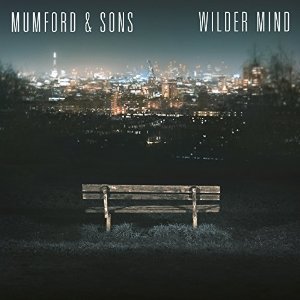Mumford & Sons – Wilder Mind review

The secret is already out – Mumford & Sons have undergone a dramatic change of sound for their third studio album, Wilder Mind. Out go the banjos, the thwacking double bass and the neckerchiefs – in come synth strings, electric lead guitar and an altogether more stadium-rock sound. Marcus Mumford and his bandmates have attempted the brave but not unprecedented move of reimagining one of the world's biggest bands while the fans were quite happy with the way things were, and, for the most part, the result is a success.
From the opening bars of first track 'Tompkins Square Park' (a tellingly un-Mumfords song title), the change of style is immediately apparent. Moody electric guitars give way to Mumford channelling Chris Martin; the gruffness factor has been reduced by 50 per cent, and Coldplay becomes the most obvious comparison from this early point on. That's cemented by 'Believe', the single which has already received so much global airplay, and provides the clearest signal that M&S are writing for arenas now, not campfires.
Then comes standout track 'The Wolf', a blow-your-head-off blast of Arcade Fire-style Proper Rock that makes you wonder if this really ever was a folk band. It's easily the best and most memorable song on Wilder Mind, but as such the album peaks early. After three really strong tracks the sound stumbles a bit and begins to run out of steam. There are further high points – 'Ditmas' is a reminder that they've not completely lost touch with their roaring folk roots, and towards the end of the album 'Only Love' is a slow starter which explodes into life with phenomenal passion. It's a solid collection of songs which promises much for the band's future, though it's by no means a classic.
While so much about the Mumfords sound has changed, the themes explored in their lyrics are all very familiar. Lots of angst and regret and relationships (and often all three together), and yes, still lots of talk of God; albeit without mentioning him too directly. The opening track includes a frustrated passage where chief lyricist Marcus is grappling with his doubts as an intellectual believer: "I just tried to work it out / But I was swallowed up by doubt / If only things were black and white / Cause I just want to hold you tight / without holding back my mind."
And 'Believe' picks up a similar theme: 'I don't know if I believe / Everything you're trying to say to me" he repeats in that radio-friendly chorus, before returning to the call to God to simply show himself: "Open up my eyes, tell me I'm alive / This is never gonna go our way / If I'm gonna have to guess what's on your mind." It's as if Marcus is saying that while his heart still believes, his head needs some evidence.
The struggle of faith and doubt, heart and mind is woven into almost every song, just as it was on the first two M&S albums. In 'Just Smoke', he's leaning toward his heart: "I saw a flicker then just smoke / But as you left I was calling your name at the night." And in 'Snake Eyes', he's caught in that conflict once more: "And the stakes remain too high for this silent mind / And the shake, the lonely itch that courses down my spine / to leave a love divine / Don't leave a love divine."
It's hard to know how much of this is a genuine struggle, and how much Marcus Mumford is merely characterising the classic battle of faith and doubt. Either way, his lyrics enable millions of people to engage with the grit, and hopefully the glory, of the same struggle. Ultimately his songs always seem to retain a glimmer of hope amid the bitterness and angst. As he writes towards the end of the album in 'Only Love', "I hunger and I thirst for some shiver / For some whispered words and the promise to come." You could imagine that being sung on Sunday in hipster churches all over America, and rightly so – it's a beautiful way to sum up the spiritual longing so many of us experience.
New sound then, but still the old themes remain. They'll lose a few fans with their move away from neo-folk; they'll probably re-engage as many people who'd previously written them off as a gimmick. If one role of the Church is to remain relevant without losing the prophetic voice, we could do worse than to learn from Marcus & co.
Martin Saunders is a Contributing Editor for Christian Today and an author, screenwriter and the Deputy CEO of Youthscape. You can follow him on Twitter: @martinsaunders











